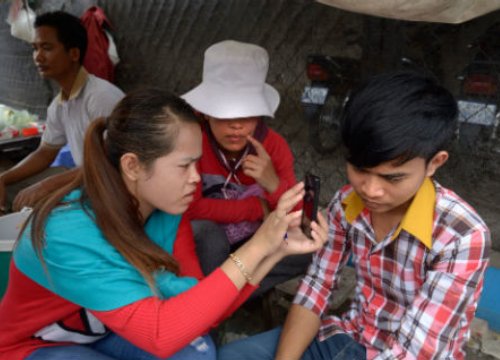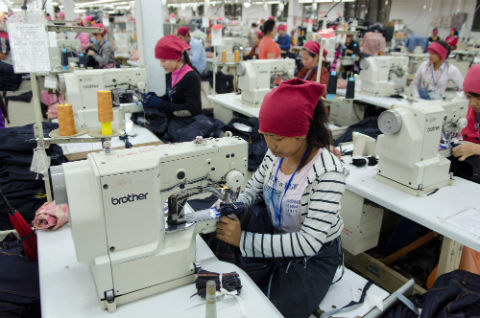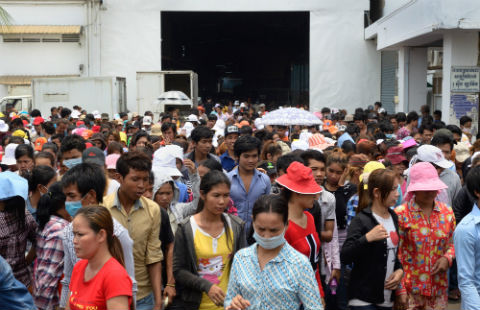
September 23, 2014
A MOBILE PHONE -based QUIZ
-based QUIZ is helping Better Factories Cambodia reach out to workers and educate them on their rights.
is helping Better Factories Cambodia reach out to workers and educate them on their rights.
 -based QUIZ
-based QUIZ is helping Better Factories Cambodia reach out to workers and educate them on their rights.
is helping Better Factories Cambodia reach out to workers and educate them on their rights.
AsianScientist (Sep. 23, 2014) – By Jerry Redfern & Karen Coates – Cambodia has more mobile phone subscriptions than citizens: 1.34 per person on average, with a total of more than 20 million nationwide, according to UN agency the International Telecommunication Union. Mobile phones are everywhere: from mountain-top temples to paddy fields to the backs of motorbikes zipping through Phnom Penh’s traffic jams. The cell phone does it all: it’s a work tool, a way of communicating, a teaching device, a gizmo and a necessary component of modern life.
And now, the mobile phone is at the heart of a project aimed at educating workers, promoting labor rights and improving communication within Cambodia’s largest export industry: CLOTHES MANUFACTURING .
.
 .
.
Kamako Chhnoeum, meaning ‘outstanding worker’ in Khmer, is RUN by the Better Factories Cambodia initiative, which is part of a global partnership between UN agency the International Labor Organization and the International Finance Corporation, part of the World Bank Group. The project uses a software that includes voice response to quiz callers about their health, wages and benefits, and
by the Better Factories Cambodia initiative, which is part of a global partnership between UN agency the International Labor Organization and the International Finance Corporation, part of the World Bank Group. The project uses a software that includes voice response to quiz callers about their health, wages and benefits, and workplace safety , and to SURVEY workers about the factories that employ them. By using the commonplace mobile phone, the project aims to reach many workers, collect information from them and provide information in return.
workers about the factories that employ them. By using the commonplace mobile phone, the project aims to reach many workers, collect information from them and provide information in return.
 by the Better Factories Cambodia initiative, which is part of a global partnership between UN agency the International Labor Organization and the International Finance Corporation, part of the World Bank Group. The project uses a software that includes voice response to quiz callers about their health, wages and benefits, and
by the Better Factories Cambodia initiative, which is part of a global partnership between UN agency the International Labor Organization and the International Finance Corporation, part of the World Bank Group. The project uses a software that includes voice response to quiz callers about their health, wages and benefits, and  workers about the factories that employ them. By using the commonplace mobile phone, the project aims to reach many workers, collect information from them and provide information in return.
workers about the factories that employ them. By using the commonplace mobile phone, the project aims to reach many workers, collect information from them and provide information in return.“We’re still just experimenting,” says Jill Tucker, Better Factories Cambodia’s chief technical advisor.
She calls the project “the tip of the iceberg” in a future full of possibilities for using information and communications technologies (ICTs) to protect labor rights.
After punching in a freephone number, callers hear a short, recorded QUIZ on labor law in one of three categories they choose: wages and allowances, occupational HEALTH AND SAFETY
on labor law in one of three categories they choose: wages and allowances, occupational HEALTH AND SAFETY , or personal health. Participants are eligible for a
, or personal health. Participants are eligible for a prize draw in which mobile phones and rice cookers are on offer.
 on labor law in one of three categories they choose: wages and allowances, occupational HEALTH AND SAFETY
on labor law in one of three categories they choose: wages and allowances, occupational HEALTH AND SAFETY , or personal health. Participants are eligible for a
, or personal health. Participants are eligible for a
Incorrect answers are immediately corrected. “Some questions I answered wrong,” a garment factory worker named Srey Pov says after calling for the first time, during a lunch break on a busy Phnom Penh street. She hadn’t realized that the law entitles her to ‘special leave’ to attend a relative’s funeral or wedding. She learned something from the short call. “It’s a good SURVEY ,” she says.
,” she says.
 ,” she says.
,” she says.“It’s definitely valuable as an educational tool for workers,” says Better Factories Cambodia consultant Maeve Galvin. “But it’s also refining our knowledge of what workers know and what workers don’t know.”
After the quiz, callers are asked to name their factory, comment on their workplace and rate it on a specified issue, such as the ability to take special leave. Eventually, Tucker says, those ratings should help “promote the factories that perform well and maybe drive workers to those factories”.

A young woman sewing at the Meng Ieng Group garment factory in Phnom Penh. The factory is participating in a programme that helps train managers to improve working conditions and communication with workers.
Worldwide, ICT projects are transforming business and education. More than five billion of the world’s six billion MOBILE PHONE subscriptions are held in developing countries, according to the World Bank, which has big hopes for ICTs: reducing
subscriptions are held in developing countries, according to the World Bank, which has big hopes for ICTs: reducing poverty , increasing productivity and economic growth, and improving accountability and governance.
 subscriptions are held in developing countries, according to the World Bank, which has big hopes for ICTs: reducing
subscriptions are held in developing countries, according to the World Bank, which has big hopes for ICTs: reducing
Kamako Chhnoeum is the first International Labour Organization MOBILE PHONE project to work in Cambodia’s garment industry, which employs more than half a million people.
project to work in Cambodia’s garment industry, which employs more than half a million people.
 project to work in Cambodia’s garment industry, which employs more than half a million people.
project to work in Cambodia’s garment industry, which employs more than half a million people.
Tucker says the project required specific strategies to work locally, where workers are not technologically savvy. Education rates are low, illiteracy rates are high (especially among rural women, who make up a large part of the factory workforce), and workers rarely SEND TEXT MESSAGES .
.
 .
.
If such a project were run in countries such as China, Indonesia or Vietnam, there would have been more options as “virtually everyone uses text and there is, in general, a higher level of education and literacy among garment workers”, Tucker explains. But in Cambodia, everything is verbal, so voice recognition software was the only option, she says
Kamako Chhnoeum has received more than 50,000 calls since it began in September 2013. Initial results indicate a high understanding of occupational SAFETY AND HEALTH (such as the importance of needle guards on sewing machines to prevent injuries), but misunderstandings about wages and benefits: Are workers on strike entitled to wages? (No.) Are workers with less than a year on the job entitled to paid maternity leave? (No.) Are workers with less than a year on the job entitled to special leave? (Yes.) Srey Pov and around 38 percent of callers got that question wrong.
(such as the importance of needle guards on sewing machines to prevent injuries), but misunderstandings about wages and benefits: Are workers on strike entitled to wages? (No.) Are workers with less than a year on the job entitled to paid maternity leave? (No.) Are workers with less than a year on the job entitled to special leave? (Yes.) Srey Pov and around 38 percent of callers got that question wrong.
 (such as the importance of needle guards on sewing machines to prevent injuries), but misunderstandings about wages and benefits: Are workers on strike entitled to wages? (No.) Are workers with less than a year on the job entitled to paid maternity leave? (No.) Are workers with less than a year on the job entitled to special leave? (Yes.) Srey Pov and around 38 percent of callers got that question wrong.
(such as the importance of needle guards on sewing machines to prevent injuries), but misunderstandings about wages and benefits: Are workers on strike entitled to wages? (No.) Are workers with less than a year on the job entitled to paid maternity leave? (No.) Are workers with less than a year on the job entitled to special leave? (Yes.) Srey Pov and around 38 percent of callers got that question wrong.
The open comments that callers leave range widely: “no space for eating lunch”, “water and toilets are not clean”, “the factory doesn’t have any problems”, “I don’t have enough money for food and house rental”. This last complaint is heard often outside factory gates and inside workers’ homes. The garment industry has suffered a year of protests for higher wages. Demonstrations in January turned violent, leaving at least five people dead. New minimum wage negotiations are set TO BEGIN in October, with union leaders seeking an increase from the current US$100 a month to US$177.
in October, with union leaders seeking an increase from the current US$100 a month to US$177.
 in October, with union leaders seeking an increase from the current US$100 a month to US$177.
in October, with union leaders seeking an increase from the current US$100 a month to US$177.
When factory worker En Eam learns about Kamako Chhnoeum, she says: “I have a question, but I don’t know how to ask.” She works two hours overtime a day in Phnom Penh, for a total wage of US$150 a month. When workers’ wages rose in the past, rent and food prices also increased. She wants to know who will solve this problem, and how. “It’s difficult for living,” she says. Like many workers, she supports younger siblings, SENDING MONEY each month back to her home province of Kampong Cham.
each month back to her home province of Kampong Cham.
 each month back to her home province of Kampong Cham.
each month back to her home province of Kampong Cham.“Wages really are everything,” Tucker says. “It’s the one issue that trumps all others for factory workers. And it’s a challenge for Better Factories when trying to address other issues.”

Garment factory workers leave the Roo Hsing garment factory for their lunch break in Phnom Penh.
Tucker admits the project faces obstacles. “We’re encountering all sorts of things we didn’t expect.” For example, many callers hang up before naming their factories. Others don’t know their factory name or don’t know how to say it, Tucker says. “It’s not SURPRISING because 99 percent of the names are either English or Chinese. They’re not Khmer.” So callers try to describe the building or its location”
because 99 percent of the names are either English or Chinese. They’re not Khmer.” So callers try to describe the building or its location”
 because 99 percent of the names are either English or Chinese. They’re not Khmer.” So callers try to describe the building or its location”
because 99 percent of the names are either English or Chinese. They’re not Khmer.” So callers try to describe the building or its location”
In addition, workers don’t want to be quizzed at the end of a ten-hour day — they want to be entertained. Tucker says the attitude is: “MAKE A GAME . If you learn something from my playing of that game, fine.”
. If you learn something from my playing of that game, fine.”
 . If you learn something from my playing of that game, fine.”
. If you learn something from my playing of that game, fine.”
In August, Kamako Chhnoeum received roughly 17,600 calls. Of those, 10,000 callers answered the ratings questions, but “we’ve only listened to about 5,000 so far,” Tucker says, “because it’s very time consuming.” Another hurdle is that each factory typically gets high, mid-range and LOW RATINGS from callers, “so we’re not necessarily seeing a trend”. There is no clear-cut information to report back to participants.
from callers, “so we’re not necessarily seeing a trend”. There is no clear-cut information to report back to participants.
 from callers, “so we’re not necessarily seeing a trend”. There is no clear-cut information to report back to participants.
from callers, “so we’re not necessarily seeing a trend”. There is no clear-cut information to report back to participants.“The main lesson LEARNEDis: this is really hard,” Tucker says. “In this field, there’s been a lot of hype and a lot of expectations.” But mobile technology hasn’t yet lived up to these. “That doesn’t mean that it’s not going to,” she says. “I still think it’s going to.”
Tucker still has big ideas. “We’ve got to think about new ways to really ENGAGEall these millions of workers out there,” she says. “We’re not interested in hotlines, we’re interested in changing the world. That’s what we want to do.”
——–
Source: SciDev.Net.
Disclaimer: This article does not necessarily reflect the views of AsianScientist or its staff.

No comments:
Post a Comment